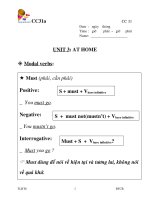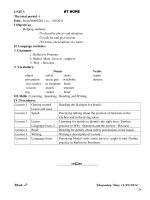ENGLISH 8 W 4 UNIT 1 P10-12 WRITE 1 2 LF UNIT 3 AT HOME GS L&READ
Bạn đang xem bản rút gọn của tài liệu. Xem và tải ngay bản đầy đủ của tài liệu tại đây (168.82 KB, 12 trang )
<span class='text_page_counter'>(1)</span><div class='page_container' data-page=1>
Date of planning: 5/9/2019 Period: 10
<b>UNIT 2: MAKING ARRANGEMENTS</b>
<b>LESSON 5: WRITE 1,2</b>
<b>A.Objectives:</b>
<b>1. Aims: By the end of the lesson, ss will be able to write a telephone message using the</b>
<b>passage or the dialogue cues </b>
<b>2. Practice skill: </b>
- Practice writing a telephone message
<b>3. The knowledge needs to get:</b>
<b>+ Standard knowledge: Write a telephone message using the passage or the dialogue </b>
<b>cues </b>
<b>+ Advanced knowledge: Ask and answer the questions about message</b>
<b>4. Basic language:</b>
+ Vocabulary: customer (n); furniture(n); delivery(n); service(n); stationery order,
reach(v); racket(n); pick …up(v).
+ Structures : Structure of a telephone message
She was out at the moment
Take a message/ Leave a message
Call …at 0 123 565 778
<b>5. Attitude:</b>
Help ss to have good consciousness in order to read and understand a passage about
the invention of the telephone. To learn hard, love their friends, and conserve their
friendship
<b>B. Teaching- aids: </b>
Lesson plan, textbooks, pictures, poster.
<b>C. Methods:</b>
- Model-Talk-Practice, individual work, pair work
- Some techniques can be used: Chatting, Gap filling, reading for specific information.
<b>D. Procedure :</b>
<b>I.Organization: ( 1 minute)</b>
<b>-</b> Greeting: Good morning!
<b>-</b> Who’s absent today?
<b>Class</b> <b>Date of teaching</b> <b>Absent students</b>
<b>8A</b> <b>16/9</b>
<b>8B</b> <b>13/9</b>
<b>II. Review of the previous lesson(2’)</b>
Ss read the text about Alexander G. Bell and answer the questions:
- Where was Alexander G. Bell born? (in Edinburgh)
</div>
<span class='text_page_counter'>(2)</span><div class='page_container' data-page=2>
<b>III. New lesson</b>
<b>Teacher’s & Students’ activities</b> <b>Content </b>
<b>*Warm up : (3’)</b>
- T asks Ss some questions
- Ss answer
- T gives mark
<b>1.Pre-writing(10’)</b>
*Aim: -SS can understand and
pronounce the new words.
T introduces the content of the
lesson: writing a telephone message
*Methods: Slap the board, noughts
and crosses.
* Work arrangement: Pair work,
Individual
* Time: 10’
* Procedure
1.Vocab
- Elicit – model – repeat (Chorally,
Individually ) – copy – check
( meaning, part of speech, stress )
* Checking vocabulary:
2. Read and gap filling.
- T talks to Sts about taking telephone
“What should you write when you
take a message?”
(date, time, name, content…)
- T has Ss read the message (p.23) and
fill in the blanks and then compare the
answers with their partners
- Ss work in pairs.
- T and Ss check the answers.
<b>2. While-Writing (16’)</b>
* CHATTING.
1. Have you got a phone ?
2. Who do you often phone ?
3. Who phones you ?
4. What’s your telephone number ?
New words:
- customer (n): khách hàng
(explanation)
- delivery service (n):dịch vụ đưa hàng đến
tận nhà (translation)
-‘stationery(n):đồ dùng văn phòng
(translation)
- pick sb up (v): đón ai (translation)
- reach (v): liên lạc (example)
- + Check: Matching
<b>* </b>
1. Read the message. Then fill in the
gaps in the passage that follows with the
information
<i><b>fill in the blanks</b></i>
<i>1.(tele)phoned </i>
<i>2. May 12</i>
<i>3. speak / talk</i>
<i>4. took </i>
</div>
<span class='text_page_counter'>(3)</span><div class='page_container' data-page=3>
*Aim: -SS can understand and write
the message
*Methods: Writing
* Work arrangement : Individual,
pair work
* Time: 16’
* Procedure
- T has Ss read the second passage to
get information and write the
message, then compare the answers
with their partners
<i> -Ss read and write the message</i>
- T and Ss check the answers.
<b>3. Post –writing: (10’)</b>
Ss write their similar message
<i>7. Mr. Ha</i>
<i>8. at</i>
2. Now read the passage below. Write the
telephone message in your exercise book
<i><b>Thanh Cong delivery service</b></i>
<i>Date: June 6</i>
<i>Time: after midday</i>
<i>For: Mrs. Van</i>
<i>Message: Mr. Nam called about his </i>
<i>stationery order. He wanted you to call </i>
<i>him at 8 634 082</i>
<i>Taken by: Mr. Toan</i>
<b>Eg: </b>
<b>Date: …</b>
<b>Time: …</b>
<b>For: Minh</b>
<b>Message: Tom called about playing football this afternoon. He will come over to pick </b>
you up at 1.30.
<b>Taken by: Lan</b>
<b>- Give feedback.</b>
<b>IV. Summary:(1’) Writing the messages</b>
<b>V. Homework : (2’)</b>
-Write the message on your notebooks. Do exercise 1,2 (page 23,24 )
- Prepare: Unit 2 Lesson 6 - Language focus
<b>*Evaluation:</b>
</div>
<span class='text_page_counter'>(4)</span><div class='page_container' data-page=4>
<b>Date of planning: 5/9/2019 Period: 11</b>
<b> </b>
<b>UNIT 2: MAKING ARRANGEMENTS</b>
<b>LESSON 6: LANGUAGE FOCUS </b>
<b>A.Objectives:</b>
<b>1. Aims: By the end of the lesson, ss will have a good chance to review: </b>
- “Be going to” to talk about intentions
- Adverbs place
<b>2. Practice skill: </b>
- Practice speaking, reading, writing skill.
<b>3. The knowledge needs to get:</b>
<b>+ Standard knowledge: Write the intention sentences using the situations given</b>
Complete the questionaire using “be going to” in interrogative sentence
Complete the speech bubbles using the adverbs of place
<b>+ Advanced knowledge: Ask and answer the questions about themselves</b>
Use “be going to” and adverbs place well.
<b>4. Basic language:</b>
<b>+ Vocabulary: novel(n); fishing rod (n); action movie</b>
+ Structures: “ be going to” and adverbs of place
<b>5. Attitude:</b>
Help ss to have good consciousness in order to do exercises.
<b>B. Teaching- aids: </b>
Lesson plan, textbooks, pictures, poster.
<b>C. Methods:</b>
- Model-Talk-Practice, individual work, pair work
- Some techniques can be used: Jumbled words
<b>D. Procedure :</b>
<b>I.Organization: ( 1 minute)</b>
<b>-</b> Greeting: Good morning!
<b>-</b> Who’s absent today?
<b>Class</b> <b>Date of teaching</b> <b>Absent students</b>
<b>8A</b> <b>17/9</b>
<b>8B</b> <b>17/9</b>
<b> </b>
<b>Teacher’s and students’ activities</b> <b>Content</b>
<b>* Warm up : (3’)</b>
- T hangs a poster of the words with
disordered letters on the board an
tells the Ss that they’re adverbs of
</div>
<span class='text_page_counter'>(5)</span><div class='page_container' data-page=5>
place.
- T asks Ss to go to the board and
write the meaningful words.
- Ss work individually (one student
one word)
- T makes sure Ss know the meanings
of these adverbs.
- T explains some words
<b>III. New lesson(24’)</b>
<b>* Presentation: 4’</b>
1. New words:
- Fishing rods: cần câu
- Action movie: phim hành động
- (to) invite sb. To somewhere: mời
ai tới đâu
2. Be going to
Ex: Nga has a movie ticket
She’s going to see a movie
-Form: S + be going to + V( inf)…
-Use: Talk about intentions.
<b>*Practice: 5’</b>
<b>1. Ask Ss to work with a partner and</b>
say what the people are going to do.
2. Ask ss to add 3 more activities to
the list.
- T asks some questions to check Ss’
understanding and focus on the
structure “be going to”
- T models two cues then asks Ss to
repeat chorally then individually
- T asks some Ss to practice asking
d. erhe = here
e. stupairs = upstairs
f. wonstairds = downstairs
1.Work with a partner. Say what the people
are going to do. Follow the example
sentence
a. They’re going to go fishing
b. She’s going to do her homework (in
Math)
d. He’s going to watch an action movie on
TV tonight.
e. She’s going to give him a birthday
present
- Ss notice
<b>2. Complete the list: </b>
Model sentences:
Are you going to see a movie ?
Yes, I am / No, I’m not
</div>
<span class='text_page_counter'>(6)</span><div class='page_container' data-page=6>
and answering.
- Ss work in pairs
- T asks the whole class to work in
pairs
- T explains how to do
- Ss work in group
- T asks some students to practice in
front of the class
- T asks Ss to make the sentences
- Ss give feedback
- T corrects
- Ss work in pairs
<b>*Presentation: 5’</b>
- T explains some words
-T makes sure Ss know the meanings
of these adverbs.
- Set the scene
Ba is playing hide and seek with his
cousin, Mr Tuan.
<b>* Practice: 5’</b>
Use the adverbs of place to complete
the speech bubbles.
Let Ss work in pairs
Then compare with another pair.
- T gives feedback
<b>* Production: 5’</b>
Write six sentences about your
house, using adverbs of place.
<b>Eg: My house is very nice. The </b>
living room is downstairs. My room
is upstairs. There is some furniture
inside. Many trees are grown outside.
We like living here.
book. Add three more activities to the list.
Then complete the “you” column with
checks and cross(7’)
a. see a movie
b. play sports
c. meet your friends
d. help your mother
e. do your homework
f. watch T.V
b) Now ask your partner what he or she
going to do. Complete the “your partner”
column of the questionnaire
3. Complete the speech bubbles. Use each
adverb in the box once(7’)
Answers:
a. Where is Tuan ?
I think he is upstairs
b. No, he isn’t here
c. He isn’t downstairs and he isn’t upstairs
d. Perhaps he’s outside
e. No, he isn’t there
f. I’m not outside. I’m inside, Ba
<i><b>-IV. Summary(1’): be going to, adverbs of place</b></i>
<i><b>V. Homework: (1’)</b></i>
- Learn by heart Advs of place
- Do exercises 5, 6 page 18, 19
</div>
<span class='text_page_counter'>(7)</span><div class='page_container' data-page=7>
<b>TEST 15'</b>
<i><b>I. Choose the best answer.(3ms)</b></i>
1- The weather ……….. nice yesterday.
a- is b- was c- will be d- has been
2- You seem ………….. , peter.
a- happiness b- happy c- happily d- happyly
3- What does she look …………..?
a- like b- alike c- likely d- likes
4- The weather is warm enough for us ……… .
a- going out b- to going out c- to go out d- go out
5- I am ………….. enough to have a lot of friends.
a- luck b- luckily c- lucky d- luckier
6- Mr Hung is going to … an interesting movie on TV tonight.
a- to see b- see c- saw d- seeing
<i><b>II. Read the passage carefully. (7ms)</b></i>
<i><b> Nien was Hoa’s next-door neighbor in Hue. She is very beautiful. She has big</b></i>
brown eyes and a lovely smile. Last week, she went to Ha Noi to visit Hoa. They
travelled around the city and saw a lot of interesting places. Nien thinks Ha Noi is
beautiful but so noisy and busy, so she doesn’t like to live there.
<i><b> Answer the following questions:</b></i>
1- What does Nien look like?
2- Does Nien have a big brown eyes and a lovely smile?
3- Where did she go last week?
4- Did they travel around the city?
5- Did they see a lot of interesting places?
6- What does Nien think about Ha Noi?
7- Does she like to live in Ha Noi?
<b>* Answer keys:</b>
<i><b>I- 0.5 m for each correct sentence</b></i>
1. b 2. b 3. a 4. c 5. c 6. b
<i><b>II- 1.0 m for each correct sentence</b></i>
1. She is very beautiful. 2. Yes, she does.
3. She went to Ha Noi. 4. Yes, they did.
5. Yes, they did. 6. She thinks Ha Noi is beautiful.
7. No, she doesn’t
<b>---*Evaluation:</b>
</div>
<span class='text_page_counter'>(8)</span><div class='page_container' data-page=8>
<b>ENGLISH 8 - TEST 15’ (NUMBER 1) 2018-2019</b>
<b>Name:</b>
………...
<b>Class : 8</b>
<b>Binh Duong Secondary School</b>
<b>Mark </b> <b>Comments</b>
<i><b>I. Choose the best answer.(3ms)</b></i>
1- The weather ……….. nice yesterday.
a- is b- was c- will be d- has been
2- You seem ………….. , peter.
a- happiness b- happy c- happily d- happyly
3- What does she look …………..?
a- like b- alike c- likely d- likes
4- The weather is warm enough for us ……… .
a- going out b- to going out c- to go out d- go out
5- I am ………….. enough to have a lot of friends.
a- luck b- luckily c- lucky d- luckier
6- Mr Hung is going to … an interesting movie on TV tonight.
a- to see b- see c- saw d- seeing
<i><b>II. Read the passage carefully. (7ms)</b></i>
<i><b> Nien was Hoa’s next-door neighbor in Hue. She is very beautiful. She has big</b></i>
brown eyes and a lovely smile. Last week, she went to Ha Noi to visit Hoa. They
travelled around the city and saw a lot of interesting places. Nien thinks Ha Noi is
beautiful but so noisy and busy, so she doesn’t like to live there.
<i><b> Answer the following questions:</b></i>
1- What does Nien look like?
2- Does Nien have a big brown eyes and a lovely smile?
3- Where did she go last week?
4- Did they travel around the city?
</div>
<span class='text_page_counter'>(9)</span><div class='page_container' data-page=9>
Date of planning: 5/9/2019
<b> </b>
<b>Period: 12</b><b> </b>
<b> </b>
<b>UNIT 3: AT HOME</b><b> GETTING STARTED & LISTEN AND READ</b>
<b>A.Objectives:</b>
<b>1. Aims: By the end of the lesson ss will be able to listen and read a dialogue between </b>
Nam and Mrs.Vui on the phone for general or detailed information
<b>2. Practice skill: - Practice listening, reading </b>
<b> 3. The knowledge needs to get:</b>
<b>+ Standard knowledge: Practice and understand the dialogue to write the things Nam</b>
has to do
<b>+ Advanced knowledge: Ask and answer more questions about the dialogue </b>
<b>4. Basic language:</b>
+ Vocabulary: cupboard(n) ; steamer(n); sink (n); saucepan(n) ; stove(n); frying pan(n);
use(v) ; ought to (v), have to (v)
+ Structures : - Prepositions of place: in, under, between, beside…
- Reflexive pronouns: yourself, myself…
- Modals: ought to, have to
<b>5. Attitude: Help ss to have good consciousness in order to listen and read a dialogue.</b>
<b>B. Teaching- aids: Lesson plan, textbooks, pictures, poster, computer</b>
<b>C. Methods:</b>
- Model-Talk-Practice, individual work, pair work
- Some techniques can be used: Noughts and Crosses, Matching, W & W
<b>D. Procedure :</b>
<b>I.Organization: ( 1 minute)</b>
<b>-</b> Greeting: Good morning!
<b>-</b> Who’s absent today?
<b>-</b> <b>Class</b> <b>Date of teaching</b> <b>Absent students</b>
<b>8A</b> <b>18/9</b>
</div>
<span class='text_page_counter'>(10)</span><div class='page_container' data-page=10>
<b>Teacher’s activities</b> <b>Students’ activities</b>
<b>II. Warm up: (3’)</b>
* Kim’s game: Getting started
- Show 6 pictures to Ss. Ask them to look at 6
pictures quickly in 30 seconds and try to
remember the verbs in the pictures as many as
possible.
- Which team remembering more verbs is the
winner.
<b>III. New lesson</b>
<b>Step 1. Presentation: (7’)</b>
*Aim: -SS can understand and pronounce
the new words.
T introduces the content of the lesson: “the
dialogue between Nam and his mom, Mrs
Vui”, and the structure: modal verbs to talk
about the housework.
*Methods: W & W
* Work arrangement: Pair, group work,
Individual
* Time: 7’
* Procedure
<b>1. Vocabulary</b>
Elicit – model – repeat – copy - check
- a steamer: nồi hấp /ˈsti.mɜː/.
- a cupboard: tủ ly /ˈkʌb.ərd/
- a saucepan: cái xoong /ˈsɔs.ˌpæn/
- a sink: bồn rửa bát
- chore (n) : công việc trong nhà
Check: What and Where
<b>2. Listen and read:</b>
- T sets the scene of the dialogue between
Nam and his mom, Mrs Vui.
- Try to remember the verbs in the
pictures as many as possible.
a. Wash the dishes/ do the washing
up.
b. Make the bed
c. Sweep the floor
d. Cook
e. Tidy up
f. Feed the chicken
</div>
<span class='text_page_counter'>(11)</span><div class='page_container' data-page=11>
- T gets Ss to listen to the dialogue while
looking at their books
- T explains new words
- T asks ss to complete the list of the things
Nam has to do.
* Structure
- T gives ss model sentences:
Nam has to cook dinner
- T asks ss to give form.
<b> have/ has to</b>
<b> must +V-inf </b>
<b> I have to go and visit grandma after</b>
<b>work.</b>
<b> She has to</b>
- Meaning: Phải ( làm gì )
- Use
+ Must / have to are used to express an
obligation.
*Note:
+ Must : Sự bắt buộc xuất phát từ lời nói từ
những tình cảm mong muốn do người nói đề
xuất.
+ Have to : diễn tả sự bắt buộc do ngoại cảnh
đưa đến khơng phải do bản thân người nói
cảm thấy hay mong muốn như vậy.
<b>Step 2. Practice: (20’)</b>
*Aim: -SS can understand and practice
using ‘ must, have to”
*Methods: Picture Drill
* Work arrangement: Individual, pair work
* Time: 20’
* Procedure
<b>Picture cues drill</b>
- T uses the pictures in getting started.
<b> Example exchange:</b>
What do you have to do?
I have to wash the dishes.
a. wash the dishes.
- Practice the dialogue with a
partner
- Read the dialogue again.
Complete the list of things Nam
has to do:
Nam has to:
- Cook dinner
- Go to the market to buy fish and
vegetables
- Call his Aunt, Miss Chi and ask
her to meet Nam’s mom at
grandma’s house
</div>
<span class='text_page_counter'>(12)</span><div class='page_container' data-page=12>
b. make the bed.
c. sweep the floor.
d. cook dinner.
e. tidy the room.
f. feed the chicken.
<b>3.Further practice:(8’)</b>
*Aim: -SS can understand and further
practice using “ must, have to”
*Methods: Write it up
* Work arrangement: Individual, pair work
* Time: 8’
* Procedure
T asks
- What do you have to do at home on
Sundays?
- Do you have to sweep the floor?
- Do you have to feed the chicken?
- Ask Ss to list the things they have to do at
home
- Compare with your partners
-T helps if necessary
<i><b>IV. Summary(1’)</b></i>
- The dialogue between Nam and Mrs Vui is
about the things Nam has to do.
<i><b>V. Homework: (2’)</b></i>
- Write 10 sentences, using have to, ought to.
- Learn by heart new words.
- Read again the dialogue page 27.
- Prepare: Unit 3: Speak + Listen (page
28 - 30)
- Ss list the things they have to do
at home
- Compare with your partners
- Answer
On Sunday morning, I have to tidy
my room, I have to help my parents
do the housework.
On Sunday afternoon, I have to …
On Sunday evening, I have to … .
<b>*Evaluation:</b>
</div>
<!--links-->









